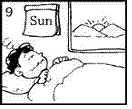
题目列表(包括答案和解析)
It was a village in India. The people were poor but they were happy. After all, their forefathers had lived in the same way for centuries.
Then one day, some visitors from the city arrived. They told the villagers there were some people elsewhere who liked to eat frog. However, they did not have enough frogs of their own, and so they wanted to buy frogs from other places.
This seemed like money for nothing. There were millions of frogs in the fields around, and they were useless to the villagers. What they had to do was to catch them. Agreement was reached, and the children were sent into the fields to catch frogs. Every week a truck arrived to collect the catch and hand over the money. The villagers were able to dream of a better future. But the dream didn’t last long.
The change was hardly noticed at first, but it seemed as if the crops weren’t doing so well. More worry was that the children fell ill more often, and there were more insects around lately. The villagers decided that they couldn’t just wait to see the crops failing and the children getting weak. They would have to use the money earned to buy pesticides (杀剂) and medicine. Soon there was no money left.
The people realized what was happening. It was the frog. They hadn’t been useless. They had been doing an important job--- eating insects. Now with so many frogs killed, the insects were increasing more rapidly. They were damaging the crops and spreading diseases.
Now, the people are still poor. But in the evenings they sit in the village square and listen to sounds of insects and frogs. These sounds of the night now have a much deeper meaning.
1.From Paragraph l, we learn that the villagers_______.
A. worked very hard for centuries
B. dreamed of having a better life
C. were poor but somewhat happy
D. lived a different life from their forefathers
2.Why did the villagers agree to sell frogs?
A. The frogs were easy money.
B. They needed money to buy medicine.
C. They wanted to please the visitors.
D. The frogs made too much noise.
3. What might be the cause of the children’s sickness?
A. The crops didn’t do well. B. There were too many insects.
C. The visitors brought in diseases. D. The pesticides were overused.
4.What is meaning of the last sentence of the article?
A. Happiness comes from peaceful life in the country.
B. Money is important.
C. The harmony between man and nature is important.
D. Good old days will never be forgotten.
I never wanted a dog, but now I'm so glad I have one. About two years ago, my wife, Cathy, got a little dog with a face only a mother could love. We named her Gertie.
Gertie is the kind of dog that has to grow on you. So I dicided that the dog would be trained. This didn't quite go as planned. At 15 weeks old, she was nearly made to leave the Petsmart Training School. She spent every night lying in our bed-snoring (打鼾)so loudly that I hardly got a good night's sleep.
Then, about six months after she arrived, I felt that something in my heart was taking place, and I was unable to stop it. My behaviour(行为方式)began to change. I began to smile at people when passing them in a street. I returned(招手)from neighbours. I started calling my kids, and to my surprise, they started calling me. I even tried to speak to my grandchildren over the phone once. I even was glad to listen to laughter from a 10-month-old granddaughter. The point is that I was changing.
My wife and I both agree that it is Gertie who has changed my behaviour. Gertie is now nearly two years old and almost fully grown.I have come to like the pet little by little, though she is my wife's dog.
【小题1】What did the man think of the dog at the beginning?
| A.It looked very beautiful. |
| B.It wasn't very lovely. |
| C.It wasn't necessary to be trained. |
| D.It could change his life. |
| A.About two years ago. |
| B.When Gertie was nearly two years old. |
| C.When Gertie was 15 weeks old. |
| D.About six months after Gertie arrived. |
| A.He began to smile at people |
| B.He liked helping his neighbours. |
| C.He started calling his kids. |
| D.He spoke to his grandchildren over the phone. |
| A.The dog has been trained very well. |
| B.The man has become more confident. |
| C.The man has become more friendly. |
| D.The man likes the dog better than his wife. |
I never wanted a dog, but now I'm so glad I have one. About two years ago, my wife, Cathy, got a little dog with a face only a mother could love. We named her Gertie.
Gertie is the kind of dog that has to grow on you. So I dicided that the dog would be trained. This didn't quite go as planned. At 15 weeks old, she was nearly made to leave the Petsmart Training School. She spent every night lying in our bed-snoring (打鼾)so loudly that I hardly got a good night's sleep.
Then, about six months after she arrived, I felt that something in my heart was taking place, and I was unable to stop it. My behaviour(行为方式)began to change. I began to smile at people when passing them in a street. I returned(招手)from neighbours. I started calling my kids, and to my surprise, they started calling me. I even tried to speak to my grandchildren over the phone once. I even was glad to listen to laughter from a 10-month-old granddaughter. The point is that I was changing.
My wife and I both agree that it is Gertie who has changed my behaviour. Gertie is now nearly two years old and almost fully grown.I have come to like the pet little by little, though she is my wife's dog.
1.What did the man think of the dog at the beginning?
A.It looked very beautiful.
B.It wasn't very lovely.
C.It wasn't necessary to be trained.
D.It could change his life.
2.When did the man's behaviour begin to change?
A.About two years ago.
B.When Gertie was nearly two years old.
C.When Gertie was 15 weeks old.
D.About six months after Gertie arrived.
3.Which of the following is NOT mentioned about the man's change?
A.He began to smile at people
B.He liked helping his neighbours.
C.He started calling his kids.
D.He spoke to his grandchildren over the phone.
4.What can we learn from this passage?
A.The dog has been trained very well.
B.The man has become more confident.
C.The man has become more friendly.
D.The man likes the dog better than his wife.
听力测试
(一)听句子,选择与画面一致的选项。每个句子听一遍。




1. ( A B C ) 2. ( A B C ) 3. ( A B C ) 4. ( A B C )
(二)请听句子,选出恰当的答语。每个句子听一遍。
( )5. A. It’s my pleasure. B. I’m sorry to hear that. C. Never mind.
( )6. A. I’m not sure. B. Yes, please. C. That’s too much.
( )7. A. Nice to meet you. B. See you later. C. What a good idea!
( )8. A. Yes, I agree with you. B. Certainly, This way, please
C. Yes, it’s very nice of you.
( )9. A. What are you going to do?
B. I think so. Why?
C. Oh, what shall I do?
( )10. A. It’s cheaper than yours. B. Fifty yuan. C. It’s expensive.
(三)对话问答:选择正确答案对话听两遍。
( )11. Who is going to visit her friends this afternoon?
A. Betty. B. Betty’s sister. C. Bob’s sister.
( )12. Why did the girl get up so early?
A.To catch the early bus.
B. To prepare for an English exam.
C. To prepare for a math’s exam.
( )13. Where was the man last Sunday?
A. He was with his friend.
B. He took a walk with his friend.
C. He went shopping with his friend.
( )14. Where does the dialogue take place?
A. In a classroom. B. In a store. C. In a computer room.
( )15. What’s the woman?
A. A shop assistant. B. A librarian. C. A customer.
( )16. When does the dialogue probably happen?
A. In the morning. B. In the evening C. At 7:45 a.m.
( )17. What place is the woman looking for?
A. A hotel. B. A cinema. C. A hospital.
(四)对话理解:
听第一段对话,回答第18-21小题。对话听两遍。
( )18. What are they talking about?
A. The moon. B. Animals. C. Plants.
( )19. How far is the moon away from the earth?
A. Three hundred metres.
B. Three hundred and eighty thousand kilometres.
C. It’s not very far
( )20. Why can nothing live on the moon?
A. People don’t like to live there. B. There’ no air or water.
C. There’s no light.
( )21. What’s the weather like tonight?
A. Cloudy. B. Rainy. C. Clear.
听第二段对话,回答第22-25小题。对话听两遍。
( )22. Where are they talking?
A. At home. B. At the cinema. C. At a shop.
( )23. How much rice did the man buy?
A. One bag. B. Two bags. C. One bottle.
( )24. How many kinds of things did the man buy?
A. Four. B. Five. C. Three .
( )25. How much did all the things cost?
A. $13. B. £300. C. $30.
(五)听短文回答问题,短文听两遍。
( )26. Where was the telephone?
A. It’s in London’s school. B. It’s in her office. C. It’s in her home.
( )27. Who made the first telephone call?
A. A man. B. Linda’s father. C. Linda’s mother.
( )28. How many telephone calls did the man make in the story?
A. One. B. Two. C. Four
( )29. Who made telephone call three minutes later?
A. The man. B. Linda’s father. C. Linda’s mother.
( )30. How many persons are there in the story?
A. Two. B. Three. C. Four.
湖北省互联网违法和不良信息举报平台 | 网上有害信息举报专区 | 电信诈骗举报专区 | 涉历史虚无主义有害信息举报专区 | 涉企侵权举报专区
违法和不良信息举报电话:027-86699610 举报邮箱:58377363@163.com